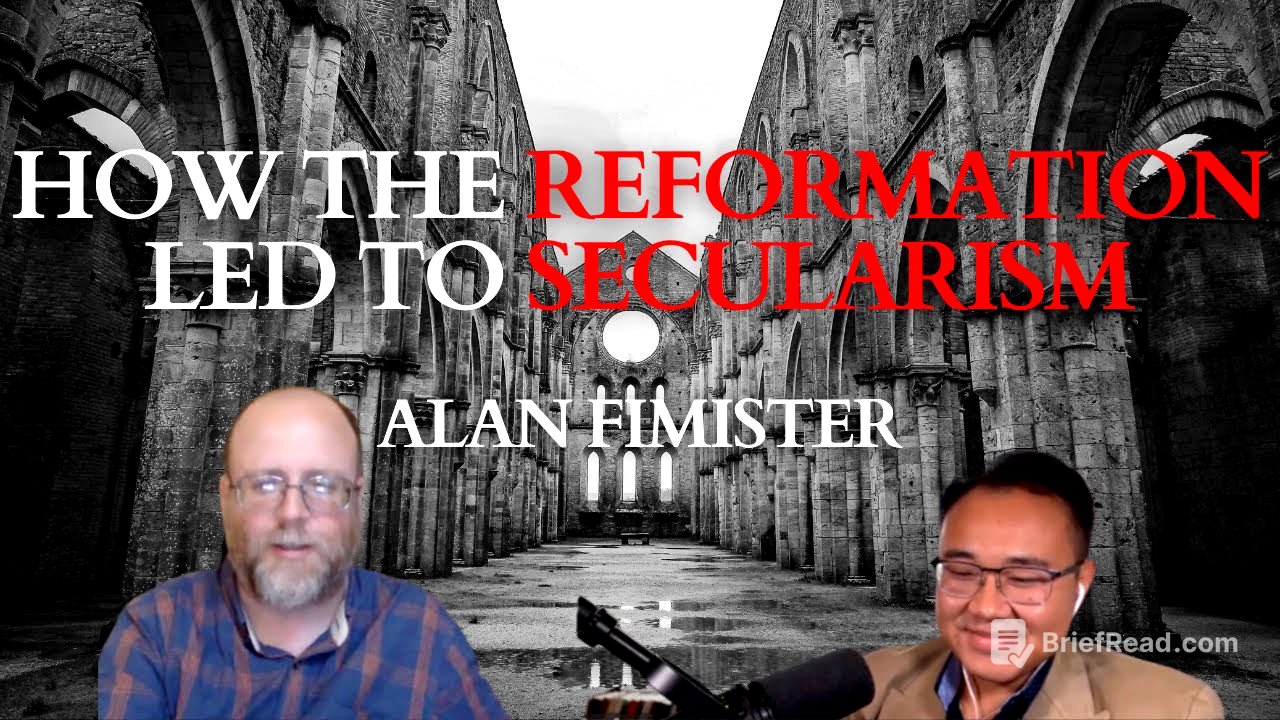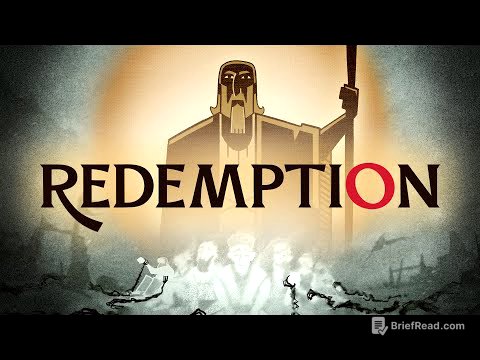TLDR;
This video features a discussion with Dr. Alan Fimister on how the Reformation unintentionally led to secularism. Fimister argues that the Reformation's emphasis on Sola Scriptura undermined the authority of the Church, leading to subjective interpretations of Christianity and ultimately, the collapse of Christian societies.
- The Reformation's emphasis on individual interpretation of scripture led to a loss of public, verifiable Christian doctrine.
- This created a vacuum that was filled by secularism, as divine revelation was excluded from public policy and law.
- The inherent logic of theism, which requires divinely revealed means of worship, was undermined, driving people towards atheism.
Introduction [0:00]
The video introduces Dr. Alan Fimister, who will discuss how the Reformation unintentionally led to secularism. Dr. Fimister is a convert to Catholicism and teaches at Holy Apostles College and Seminary. He co-authored the book "Integralism" with Father Thomas Korean.
Suan's Story [2:36]
The host shares his background as a former Baptist Protestant who converted to Catholicism in college. He recalls being introduced to the idea that the Reformation unintentionally led to secularism, which sparked his interest in the topic.
Is this a silly argument? [3:39]
Some Protestants might dismiss the idea that the Reformation led to secularism as a Catholic cliché or find it impossible to believe, given the devout religious beliefs of the reformers. Dr. Fimister responds by sharing his perspective as a convert from atheism, stating that the connection between Protestantism and secularism was obvious to him even as a child.
Fimister's Argument [5:48]
Christianity is divine revelation imparted to mankind for salvation, something humans couldn't have known otherwise. This revelation is transmitted over time, through scripture for Protestants. However, understanding scripture requires knowledge of ancient languages, reliable texts, and correct interpretation. The claim that the Holy Spirit guides individual interpretation is problematic because of the vast disagreements among those who believe in scripture. For example, Baptists and Presbyterians disagree on the necessity of infant baptism, yet accept each other as Christians. This undermines the idea of a unified body of true believers.
Nonreligious Consensus on this point [23:15]
Dr. Fimister highlights that even atheists and non-religious individuals often recognize the connection between the Reformation and the rise of secular culture. Academic historians generally agree on this point, focusing more on the specific details of how the Reformation led to secularism rather than questioning the overall connection.
Protestant Responses [30:31]
Some Protestants might argue for a minimalist Christianity, uniting on essential doctrines derived from scripture through rigorous exegesis. However, Dr. Fimister counters that this approach still excludes Catholics and Orthodox Christians, who hold different views on essential practices like baptism. He argues that if the set of true believers includes Presbyterians and Baptists, they obviously disagree or they don't think it's necessary of Salvation in either case and they don't think in the back case the Baptist they don't think it should be conferred so it's if you can hardly agree on Essentials if the salvation of everyone up to seven could be completely ruined.
Suan's Summary of Fimister's Argument [37:46]
The core argument is that Sola Scriptura introduces an inherent anarchy that cannot sustain a Christian society. Christianity is a religion of public revelation, but if its interpretation is left to individual human reason, it leads to conflicting interpretations and undermines its ability to govern God's people. A universal authority, divinely endorsed and infallibly protected, is necessary to maintain unity and prevent the disintegration of Christian society.
Atheism [39:47]
Without a publicly verifiable revealed doctrine, the official philosophy of the neutral state ends up becoming atheism by default.
Secularism Defined [41:29]
Secularism is defined as the formal exclusion of divine revelation as a principle of public policy and public law.
Reformers would oppose secularism!!! [42:27]
Some might object that the reformers themselves were in favor of Christianity being part of the state. However, Dr. Fimister argues that they lacked the logical equipment necessary to sustain this position. The claim that everyone in good faith will read scripture in the same way is unsustainable, leading to the collapse of both polities and sects.
Conclusion pt. 1 [43:58]
Without a universal institution, Sola Scriptura can lead to individual interpretations of the Bible, undermining the basis for a Christian society. The state naturally reacts by excluding Christianity from public life because if Christianity is true then the Christian Revelation would necessarily Trump any Prudential decisions of the temporal order.
Conclusion pt. 2 [46:17]
The Reformation created a society in which public revelation couldn't govern God's people, leading to a need for tolerance and neutrality on controversial moral and spiritual issues. This ultimately resulted in the development of a secular liberal order, as the Reformation created a society that couldn't sustain a Christian worldview.









